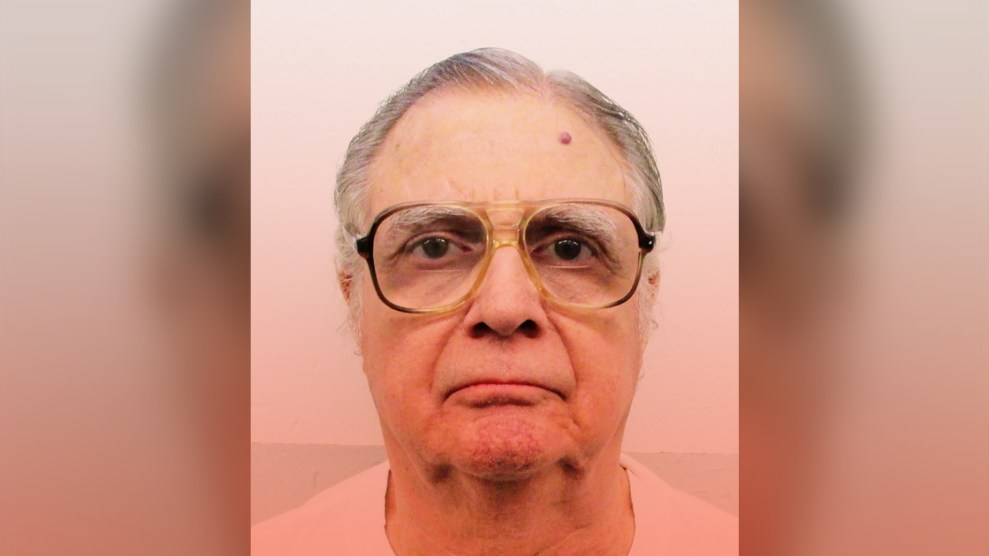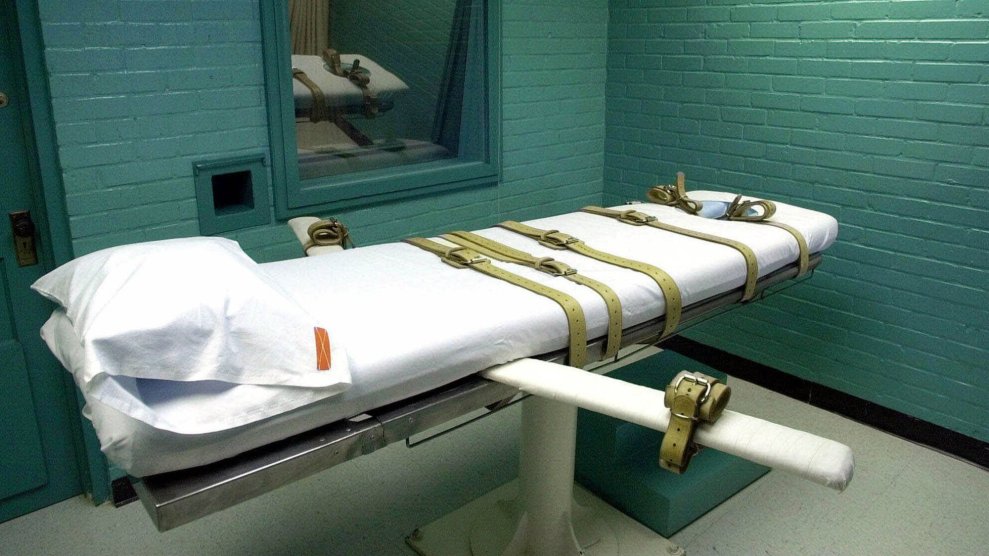
Alabama Department of Corrections via AP
Update, May 26, 2017: Early this morning, Alabama executed Thomas Arthur for the 1982 murder of Troy Wicker. Arthur had been on death row for more than 30 years and survived seven previous execution dates. His final words were to his children. “I’m sorry I failed you as a father. I love you more than anything on Earth.”
Arthur’s execution began at 11:50 p.m. after the US Supreme Court lifted its temporary stay allowing the state to proceed. Justice Sonia Sotomayor offered a two-page dissent saying, “I continue to doubt whether midazolam is capable of rendering prisoners insensate to the excruciating pain of lethal injection and thus whether midazolam may be constitutionally used in lethal injection protocols.”
The court also denied Arthur’s lawyers’ petition to have a phone in the death chamber, which they wanted to use to call the courts in case the execution went awry. The last inmate Alabama executed heaved and coughed for 13 minutes after the midazolam was administered. In her dissent, Justice Sotomayor said that prisoners have a right to access to courts and that Alabama has no “legitimate reason” for prohibiting his lawyers from having a phone. “Its action means that when Thomas Arthur enters the execution chamber tonight, he will leave his constitutional rights at the door,” she stated.
Arthur’s execution was witnessed by his 55-year-old daughter, Sherrie Stone. She released a statement shortly after her father’s death. “I have never known for certain whether my father killed Troy Wicker – at times I was convinced he was the killer, and at other times I believed he was innocent,” she said. “Now I will never know the truth because the evidence that could prove if my father was innocent or guilty has not been tested for DNA using the latest technology.”
Alabama has been trying to put Thomas Arthur to death for more than 30 years. The 75-year-old inmate, who has consistently maintained his innocence for a 1982 murder, has had three trials and survived seven execution dates since 2001. On Thursday, Alabama will attempt to execute him again.
“I didn’t have anything to do with this,” he tells Mother Jones from the Holman Correctional Facility, where Alabama houses most of those on death row. “I gave ’em hair and spit and everything…and they found nothing.”
I spoke with Arthur the week he is scheduled to die. His lawyers arranged for a 30-minute phone conversation to give him a chance to tell his story, maybe for the last time. He spoke rapidly, stumbling over some sentences in a rich Southern accent that sometimes blurred the clarity of his words. But there was no lack of clarity in his reflections of what it has been like to be one of the first inmates sent to death row in Alabama—after the practice was reinstated after a 1976 landmark Supreme Court ruling—and to live there for 34 years.
During that time, his health has deteriorated, and he has stood by while 58 other inmates were executed. Holman, like many of Alabama’s prisons, became overcrowded and crumbling and was the scene of a riot in 2016. He has watched the methods of execution change, from the electric chair to midazolam, a controversial drug that will be used on him, despite efforts his lawyers have made to convince the courts that given his heart condition, the drug might not be effective and would likely cause undue suffering. He has also had a lengthy education in the criminal justice system from three different trials and the seven times he believed he would die, only to have his execution postponed. At this point, Arthur still hopes for DNA evidence to prove his innocence. “If they just let [my lawyers] in a courtroom,” he says, “we wouldn’t be at this juncture.”
Arthur’s journey to death row began on February 1, 1982, when Troy Wicker was shot and killed in his bed in the northwest Alabama city of Muscle Shoals. On the day of the murder, his wife, Judy Wicker, told police that she came home after taking her children to school to find a black man in her home. She claimed that the intruder raped her, knocked her unconscious, and shot her husband. Police found bullets but no murder weapon. Wicker went to the hospital and her rape kit was subsequently lost.
Judy was a suburban mom and Arthur was a convicted criminal—he was serving time for having shot and killed his common-law wife’s sister in 1977. “When I took [her] life, alcohol was a factor,” he says. “I shouldn’t have shot that girl.” Arthur had been given a life sentence, but after just four years he was participating in a prison work-release program, where an inmate is let out of the prison facility during the day for employment and trusted to return to prison in the evening. That’s when Judy Wicker and Thomas Arthur began having an affair.
Police didn’t find Wicker’s description of the circumstances of her husband’s death credible and charged her with murder-for-hire. They also arrested Arthur and charged him with aggravated murder. At her 1982 trial, where Wicker testified that Arthur was not involved in the murder, she was given a life sentence. At a separate 1983 trial, prosecutors argued Arthur shot and killed Wicker for $10,000—part of the life insurance Wicker received upon her husband’s death. Despite his incriminating record, Arthur insisted he had nothing to do with this crime. Nonetheless, he was convicted, sentenced to death, and taken to Holman Correctional facility.
The Holman Correctional Facility is nearly 50 years old and located in rural Escambia County. On death row, the cells are tiny. “We’re, like, sandwiched in here,” Arthur says. “I live in a cell you can’t put a baboon in.” A heart condition prevents him from exercising or spending time in the yard like other death row inmates do. “I’m in here 24 hours a day. Been like that for 10 years.” He spends most of his days watching the news and daytime soap operas—Days of our Lives, for instance, and the Young and the Restless—on the TV that his lawyers bought for him in 2003. In its last session, the Alabama Legislature took up a bill to build up to four new state prisons by borrowing up to $800 million. “We got toilet water running down the walls all over death row,” Arthur claims. “They want to spend $800 million for new prisons when they could spend $200 [million] to fix the ones they already have!” he says incredulously.
Arthur was granted a retrial after his first conviction was overturned because details of his previous murder conviction were introduced in the trial. In 1986, while awaiting retrial, Arthur was held in a county jail. He escaped after shooting a jail official in the neck, but the guard survived. Arthur got as far as Knoxville, Tennessee, where FBI agents found him a month later after he robbed a bank. The following year, he was convicted and sentenced to death again.
His second conviction was overturned on appeal because in 1982 Arthur was interviewed by an investigator without an attorney present. He was granted yet another trial. According to Amnesty International, an international human rights organization that is against the death penalty, it was then that the prosecutor asked the state’s parole board if Judy Wicker could get an early release if she testified against Arthur. At the 1991 retrial, Wicker changed her story, implicating Arthur in the murder. She was paroled a year later, after serving just 10 years in prison.
In Furman v. Georgia, in 1972, the US Supreme Court ruled in a 5-4 decision that capital punishment was unconstitutional, halting executions nationwide. Four years later, the high court reversed course in Gregg v. Georgia and ruled that the death penalty was not cruel and unusual punishment.
The first time Alabama tried to put Arthur to death was in 2001, but he received a stay two days before the scheduled execution date so federal courts could hear challenges concerning the fact that he had no representation when his first execution date was set. This began a period of execution dates and stays of execution. After several legal challenges were dismissed, Alabama set another execution date for Arthur in September 2007. Once more he prepared himself to be executed, but he was spared when the state itself requested a 45-day reprieve in order to change its drug protocol for lethal injections. Around this time, various inmates had challenged lethal injection protocols in their states. A few months later, in December 2007, Arthur received another stay from the US Supreme Court because it was considering a challenge in Kentucky over a very similar lethal injection protocol. His fourth execution date was planned for 2008.
Then an inmate, Bobby Ray Gilbert, at another Alabama prison, confessed to the crime. Arthur filed a petition claiming innocence, and the execution was stayed so the court could hold a limited hearing. No physical evidence linked Gilbert to the crime, and the court concluded Gilbert was lying to protect Arthur. Prosecutors have long held that Troy Wicker’s killer wore a wig, but none of Arthur’s DNA was on that wig or on the clothes Judy Wicker wore on the day of the murder. “I am totally innocent,” Arthur insists. “And DNA could prove it.”
Until 2002, Alabama used the electric chair to execute inmates. “You could smell them,” Arthur says about the inmates being executed. “You could actually smell the flesh burning.” His next two scheduled executions in 2012 and 2015 were stayed because of Arthur’s challenges to the state’s drug protocol, which included the sedative, pentobarbital. But then came the introduction of the controversial sedative midazolam for executions. After multiple states faced a shortage of lethal injection drugs, Alabama began using midazolam early last year with the execution of Christopher Brooks in January. Nearly a year later, in December 2016, the state executed Ronald Bert Smith Jr. After administering the drug, Smith reportedly struggled for breath, coughed, heaved and clenched his left fist for 13 minutes.
Arthur’s seventh execution date was scheduled for November 3, 2016. His case claiming the lethal injection protocol used by the state could cause excruciating pain was dismissed by the federal court. Despite the widespread acceptance that lethal injection is humane, there is no scientific research to prove it.
Under the 2015 Supreme Court case Glossip v. Gross, the usage of midazolam does not violate the Eighth Amendment, which prohibits cruel and unusual punishment and rules that states must have a ready and available alternative if one form of execution falls into that category. In his appeal, Arthur proposed the use of firing squad. The court dismissed his case, saying that since Alabama law does not expressly allow firing squads, it was not a viable alternative.
That night, the Supreme Court granted a stay pending a review of his claims. But in February, it declined to hear his appeal. In an 18-page dissent, Justice Sonia Sotomayor said the use of midazolam could lead to “prolonged torture” of inmates. “Condemned prisoners, like Arthur, might find more dignity in an instantaneous death,” she wrote, “rather than prolonged torture on a medical gurney.”
In April, Arthur’s lawyers wrote to Alabama Gov. Kay Ivey in hopes of getting further DNA testing. His counsel noted that more advanced technology was available and they would assume the costs of the test. Ivey turned down their request. A few weeks later, Arthur sent a handwritten note asking Ivey to spare his life. “Please do not let me die for a crime I did not commit,” he wrote.
The decades of confinement have taken a toll on him. “One time I was a halfway decent looking fellow,” he says with a laugh. “Now, I look like I’ve been hit by a truck.”
And now, as he faces his next and likely final execution date, Arthur says ruefully, “I laugh to keep from crying.” But he is troubled about the life he lost, how his four children never truly had a father, and how much he regrets not being there for them. “I want to publicly apologize in case they do kill me,” he says. “I want the public to know that I failed them as a father.” He also has no interest in the usual formalities accompanying executions in America. “I’m not going to the eat the last meal, which would come at taxpayer expense,” he says.
What is it like to face death so many times? “It’s the same thing every time,” he says with a sigh. “Everyone has a fear of dying…but the state of Alabama is going to—and I don’t use this word lightly—murder me for something I didn’t do.”

















